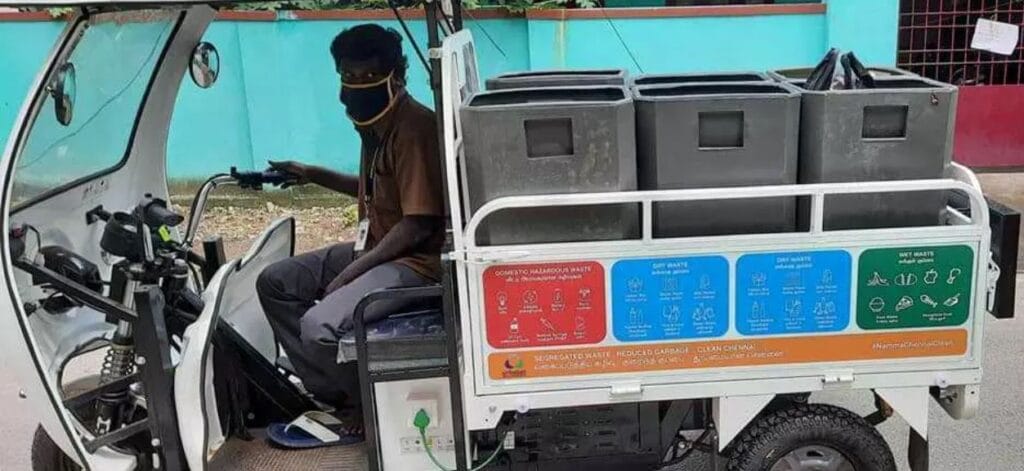The Union Ministry of Housing and Urban Affairs (MoHUA) recently released the results of the 2023 Swachh Survekshan, a cleanliness survey conducted as part of the Swachh Bharat (Urban) campaign that covers 446 cities. The evaluation parameters covered the cleanliness levels of residential and commercial areas as well as public spaces, water bodies, parks, schools and waste management arrangements.
Indore and Surat shared the first rank while Navi Mumbai bagged third place. As for our State, the survey results are rather tepid – no city in Tamil Nadu made it to the top 100 clean cities list. Trichy was named the cleanest city in the State with a national rank of 112, while Chennai came in at a lukewarm rank 199 at the national level and rank 5 at the State level.
Read more: What happens to your dry waste in Chennai?
There are small victories that deserve acknowledgement. The 2022 Swachh Survekshan results was conducted a bit differently — it covered cities with a million plus populations while the current 2023 survey covers urban local bodies with populations greater than one lakh. Still, media reports say that the city has fared better this year — according to The Hindu, GCC has improved its position from 44 to 37 while The New Indian Express states that Chennai’s cleanliness score has gone up from 37 per cent to 45 per cent.
Chennai has much to achieve in SWM
The city was also declared ODF++ (Open Defecation Free), indicating that it has proper toilet facilities and sewage management in place. The survey results also attested that Chennai achieves 79 per cent source segregation of solid waste.
The city has unarguably shown improvement, but there is much yet to do. For instance, the city is not yet bin free and a 100 per cent source segregation of waste is still some ways away. Other TN cities have managed to achieve these — Trichy and Vellore are bin-free; Coimbatore has 100 per cent house-to-house waste collection; and Madurai has 100 per cent source segregation. No doubt, Chennai is larger and services a much denser population, but perhaps there may be a few best practices to emulate?

Achieving 100 per cent door-to-door waste collection remains a challenge. According to the 2023 TNPCB Annual Report on the implementation of solid waste management rules, Chennai’s house-to-house collection falls in the 80–100 per cent coverage bracket; the city has a total of 2,121,466 households, and the service is extended to 1,866,890.
Further, of the 6,150 tonnes of garbage generated every day, GCC manages to process only 960 tonnes of wet waste and 840 tonnes of dry waste; biodegradable waste is sent to decentralised waste processing facilities while dry waste is sent to incinerators. The remaining garbage — a sizeable amount — is dumped at the landfill sites at Kodungaiyur and Perungudi. Clearly, there is much scope to reduce the amount of dumped garbage.
However, the city is currently challenged by the lack of processing facilities when it comes to solid waste processing. There is perhaps scope to promote decentralised composting for it will help reduce the dependency of residents on a likely already-stretched municipal waste collection service. It will also make room for the reuse of organic waste, which will reduce the burden on waste transportation.
Read more: Chennai’s ongoing battle to improve waste management
GCC plans to address waste management issues
The GCC has already undertaken initiatives to improve parameters under Swachh Survekshan. Awareness campaigns are being conducted through various mediums ranging from radio to street plays, to encourage cleanliness and waste segregation. Toilet mapping has been done; 3,000 city toilets are likely to undergo renovation while there are plans to build new toilets in 90 locations. The facilities will have free air circulation, solar lighting and water reuse.
A lot of work is underway to address the lack of waste management facilities as well. Bio-mining at the Perungudi landfill is reportedly in process; it is said that 100 acres of land has already been reclaimed. A tender was floated in August last year to bio-mine and reclaim the Kodungaiyur dumpyard as well, according to the GCC website.
Plans are afoot to set up integrated waste processing facilities with a waste-to-energy plant at both dump sites. The Hindu reports that five bio CNG plants of 100 tonnes a day each are in construction and that a proposal has been approved by TNIDB to install integrated municipal solid waste processing facilities such as a 1,400 tonnes per day (TPD) waste to energy plant with material recovery facility, a 550 TPD bio CMG plant and a 800-TPD compost plant.
To quote a senior Corporation official in The New Indian Express, Chennai appears to be in a transition phase with multiple infrastructure projects aimed at mitigating many civic issues. Successful execution may well bear fruit by the time the next survey comes around, boosting the city’s rankings.
[This article first appeared in Madras Musings, Vol. XXXIII No. 19, January 16-31, 2024, and has been republished with permission. The original article may be read here.